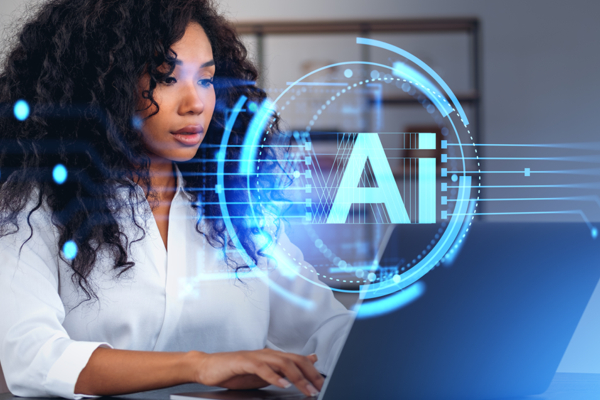By Vivo Team Development
Artificial intelligence (AI) is rapidly transforming the workplace, automating tasks, and opening new possibilities for innovation. But, as AI reshapes how we work, the skills that truly drive success are not just technical; they’re human. In an AI-driven era, people skills are more crucial than ever, as they form the foundation of highly-effective teams and successful organizations.
While AI excels at handling data, automating routine tasks, and improving workflows, it cannot replicate the creativity or contextual understanding that comes from human interaction and experiences. Empathy, flexibility, and active listening are becoming increasingly sought after skills.
“92% of US executives agree that people skills are more important than ever.”
(Source: LinkedIn US Executive Confidence Index Survey, June 2023)
The following people skills, along with effective leadership, provide a roadmap for high performance in an AI-powered workplace. These indicators ensure that teams can successfully integrate AI while maintaining the human touch that drives collaboration, creativity, and innovation.
Communication: Enhancing Productivity and Reducing Delays
Clear and open communication is critical to team effectiveness. Misunderstandings or gaps in communication can slow down progress and disrupt workflows, especially when navigating the complexities of AI integration.
By fostering an environment of transparent and consistent communication, leaders can minimize delays and ensure that both human team members and AI systems are aligned. Open communication also helps team members understand how AI fits into their work, ensuring everyone is on the same page and able to maximize AI’s benefits.
Interactive Feedback: Reflecting and Adapting for Continuous Improvement
AI provides a wealth of data, but its effectiveness depends on how well teams can interpret and apply that information. A strong feedback culture is essential for continuous learning and performance improvement. Regular, interactive feedback allows teams to reflect on past actions and anticipate future outcomes, ensuring they stay agile and responsive to both human and AI-driven insights.
This feedback loop enables employees to adapt to changes and identify areas for growth, leading to better decision-making and more effective integration of AI tools.
Emotional Intelligence: Navigating Emotions and Building Psychological Safety
While AI can process data at lightning speed, it cannot navigate the complex emotions that are part of human interactions. Emotional intelligence (EQ) is essential for building psychological safety within teams—where individuals feel comfortable expressing themselves, sharing ideas, and taking risks without fear of judgment.
High EQ enables team members to identify and manage their emotions while understanding the emotional dynamics of others. This reduces assumptions and fosters a supportive, collaborative environment where people can thrive. In workplaces utilizing AI, emotional intelligence remains critical for maintaining healthy interpersonal relationships and promoting innovation.
Structures: Building Efficient and Unified Workflows
AI can optimize many processes, but without strong organizational structures in place, even the best technology can lead to chaos. Establishing clear and unified behavior expectations and work processes is vital for ensuring that both human and AI contributions are aligned and effective.
Streamlined structures help teams work efficiently, preventing redundancies and confusion as AI tools are integrated into workflows. A well-structured environment allows employees to leverage AI’s strengths while focusing on higher-level, human-centered tasks like new innovations and strategic thinking.
Accountability: Driving Innovation and Building Trust
In an AI-enhanced workplace, accountability is more important than ever. AI can automate many tasks, but responsibility for outcomes still lies with human team members. Holding one another respectfully accountable fosters a culture of trust, innovation, and productivity.
When employees take ownership of their roles and their use of AI tools, it ensures that AI is used responsibly and effectively. This sense of accountability drives continuous improvement and helps teams stay focused on their goals, even as AI takes on a larger share of routine tasks.
Cohesion: Increasing Engagement and Collaboration
Team cohesion is the glue that holds high-performing teams together, and it becomes especially important when integrating AI. As technology reshapes roles and workflows, maintaining strong connections between team members is key to sustaining satisfaction, engagement, and collaboration.
Cohesive teams work more effectively together, leading to increased success and productivity. Leaders must focus on building and maintaining these bonds, ensuring that team members continue to collaborate and innovate as a unit.
Leadership: Guiding Teams Through Technological Change
Strong leadership is the cornerstone of success in any workplace. Leaders must guide their teams through the integration of AI, balancing technological advancements with human-centered development. Great leaders understand that while AI can optimize workflows, it is their role to inspire, motivate, and empower their teams to use these tools effectively.
By prioritizing people skills like communication, emotional intelligence, and accountability, leaders can ensure that their teams not only embrace AI but also continue to grow and develop the human capabilities that drive long-term success.
AI is a powerful tool, but it cannot replace the human qualities that make teams truly great. By focusing on key people skills—communication, interactive feedback, emotional intelligence, structures, accountability, and cohesion—leaders can build high-performing teams that thrive alongside AI. In the end, the future of work is not just about AI; it’s about empowering people to work smarter, more creatively, and more collaboratively.
The rise of AI doesn’t diminish the importance of people—it elevates it. Leaders who invest in these skills today will build teams that are more innovative, resilient, and adaptable to the changes of tomorrow.
About Vivo Team Development
Vivo Team is a tech-driven learning and development company providing leaders and teams with the skills, analytics, and insights they need to succeed. This results in increased engagement and productivity—and the data to prove it!

